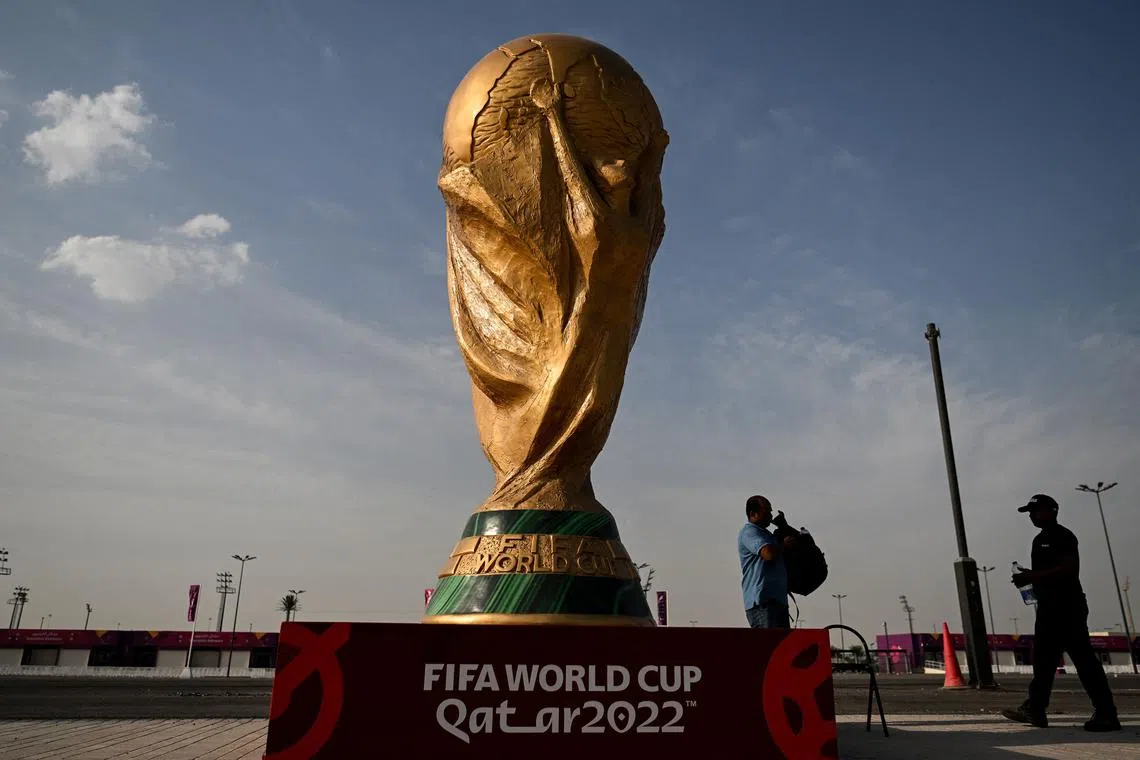World Cup: Qatar tournament faces new edict – hide the Beer
Sign up now: Get the biggest sports news in your inbox

Qatari organisers have been working hurriedly in recent days to relocate Budweiser-branded beer stations at eight stadiums.
PHOTO: AFP
NEW YORK – The message came from the highest levels of the Qatari state – the beer tents must be moved and there would be no discussion about it.
With the opening game of the World Cup only days away, Qatari organisers have been working hurriedly to move Budweiser-branded beer stations at eight stadiums to “less visible locations” after a sudden demand that those with knowledge of the belated change said had come from inside the country’s royal family.
They spoke on condition of anonymity because they were not authorised to discuss sensitive planning details for the tournament.
World Cup officials appeared to confirm the changes in a statement, however. Budweiser said it learnt of the new plan only on Saturday – eight days before the tournament’s first game.
The decision to move the beer stations appeared to be rooted in concern that the prominent presence of alcohol at stadiums during the World Cup would unsettle the local population and thus represent a potential security problem.
But it also highlighted an issue that has stalked the first World Cup in the Arab world, and that is expected to be contentious throughout the tournament in Qatar, a conservative Muslim country where access to alcohol is tightly controlled.
Ever since Fifa awarded the hosting rights to Qatar in December 2010, the organisers have grappled with balancing the obligations they signed up to fulfil – including the sale of alcohol and providing promotional space for Budweiser, one of Fifa’s biggest sponsors – with concerns about upsetting a domestic constituency that has chafed at some of the culture clash inherent in bringing a traditionally beer-soaked event to a Muslim nation.
Alcohol is not banned in Qatar, but most visitors are able to purchase it only at bars inside designated hotels.
Fifa and Qatari officials had struggled for years to devise a plan for the World Cup, where beer has flowed freely for generations, before finally deciding that the sale of alcoholic beverages would be permitted within a security perimeter outside venues but not inside the stadiums.
Still, moves that limit Budweiser’s branding or affect its ability to sell its products could complicate Fifa’s relationship with a powerful partner, not to mention the contractual relationship between the brewer, the governing body and Qatari organisers.
Budweiser pays roughly US$75 million (S$102.5 million) to associate itself with the World Cup every four years.
But a World Cup in Qatar has produced unusual obstacles, and led to ongoing tensions between the company and Fifa over issues ranging from agreeing on sales points in Qatar to negotiating how to get supplies into the country.
Budweiser’s contract with Fifa not only gives it sales exclusivity but also requires it to provide vast quantities of beer for Fifa’s partners and hospitality guests.
Budweiser said it was not informed of the changes by Fifa until Saturday. The company is “working with Fifa to relocate the concession outlets to locations as directed”, a Budweiser spokesman told The New York Times in a statement.
The spokesman declined to disclose if the company was getting the rights it was entitled to under its contracts, saying only that “our focus is on delivering the best possible consumer experience under the new circumstances”.
A representative of the World Cup organising committee released a statement – which it said was on behalf of both the tournament and Fifa – that played down the changes.
“Operational plans are being finalised. This has a direct impact on the location of certain fan areas,” it read.
The statement made no mention of beer and noted that “pouring times and the number of pouring destinations” remained the same at all eight stadiums.
The sudden change on alcohol sales is in keeping with the ever-shifting build-up to the 2022 World Cup. Work to complete hotels and accommodation to house the estimated 1 million visitors continues even this week, and changes large and small have been made even as the first matches loomed.
Since they started bidding for the World Cup in 2009, Qatari officials have said that beer would be more widely available during the tournament, but that it would be sold and consumed on terms that respected local customs.
An experiment to sell beer around the 2019 Club World Cup ended with mixed results.
For that event, Qatari officials built a fan zone on the outskirts of Doha where fans were allowed to drink freely for hours each day. Supporters were then ferried by buses to the stadium, a journey that took about 45 minutes.
Organisers have also created similar destinations for the World Cup. NYTIMES


